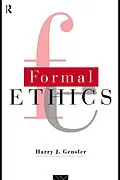Formal Ethics is the study of formal ethical principles. The most important of these, perhaps even the most important principle of life, is the golden rule: Treat others as you want to be treated. Although the golden rule enjoys support amongst different cultures and religions in the world, philosophers tend to neglect it. Formal Ethics gives the rule the attention it deserves.
Modelled on formal logic, Formal Ethics was inspired by the ethical theories of Kant and Hare. It shows that the basic formal principles of ethics, like the golden rule, are very similar to principles of logic, and gives a firm basis for our ethical thinking. As an introduction to moral rationality, Formal Ethics also considers non-formal elements, and is applied to areas of practical concern such as racism and moral education
Autorentext
Harry J. Gensler, S.J.is Associate Professor of Philosophy at the University of Scranton. He is the author of Göxdel's Theorem Simplified, Logic: Analyzing and Appraising Arguments, and Symbolic Logic: Classical and Advanced Systems. He has also written LogiCola, a logic instructional program.
Zusammenfassung
This volume brings together many of the leading researchers on human intelligence and cognition to address issues including definition, measurement, and instructional design. Its publication is a result of the Inaugural Spearman Seminar recently held at the University of Plymouth -- a seminar that is slated to become a regularly scheduled event providing a major international forum for the presentation of work on human abilities. To properly inaugurate this series, scientific experts in this field were asked to reflect on various issues raised but not resolved in Charles Spearman's classic work, The Abilities of Man: Their Nature and Measurement, published in 1927. As a result of this approach, the book offers a unique overview of the way in which the study of human abilities has developed since 1927, and of current positions in the field. It offers exhaustive discussions on: * the nature of cognitive abilities and intelligence -- a review of how the factor analytic approach to abilities which grew out of Spearman's work has developed, thoughts regarding the contribution of a cross-cultural perspective, and an elucidation of some of the conceptual issues which often cloud discussions of ability; * different aspects of the contribution of cognitive psychology to our understanding of abilities -- the relationship between Spearman's g and working memory, links between attention and cognitive style, and the area of spatial abilities; * recent developments in latent variable and item response modeling; and * applied issues -- the argument that little predictive value can be gained in occupational selection from measuring abilities other than Spearman's g, and the question of aptitude treatment interactions in education.
Inhalt
Chapter 1 What Is Formal Ethics?; Chapter 2 Logicality; Chapter 3 Conscientiousness; Chapter 4 Impartiality; Chapter 5 The Golden Rule; Chapter 6 Universal Law; Chapter 7 Moral Rationality; Chapter 8 Symbolic Logic;
